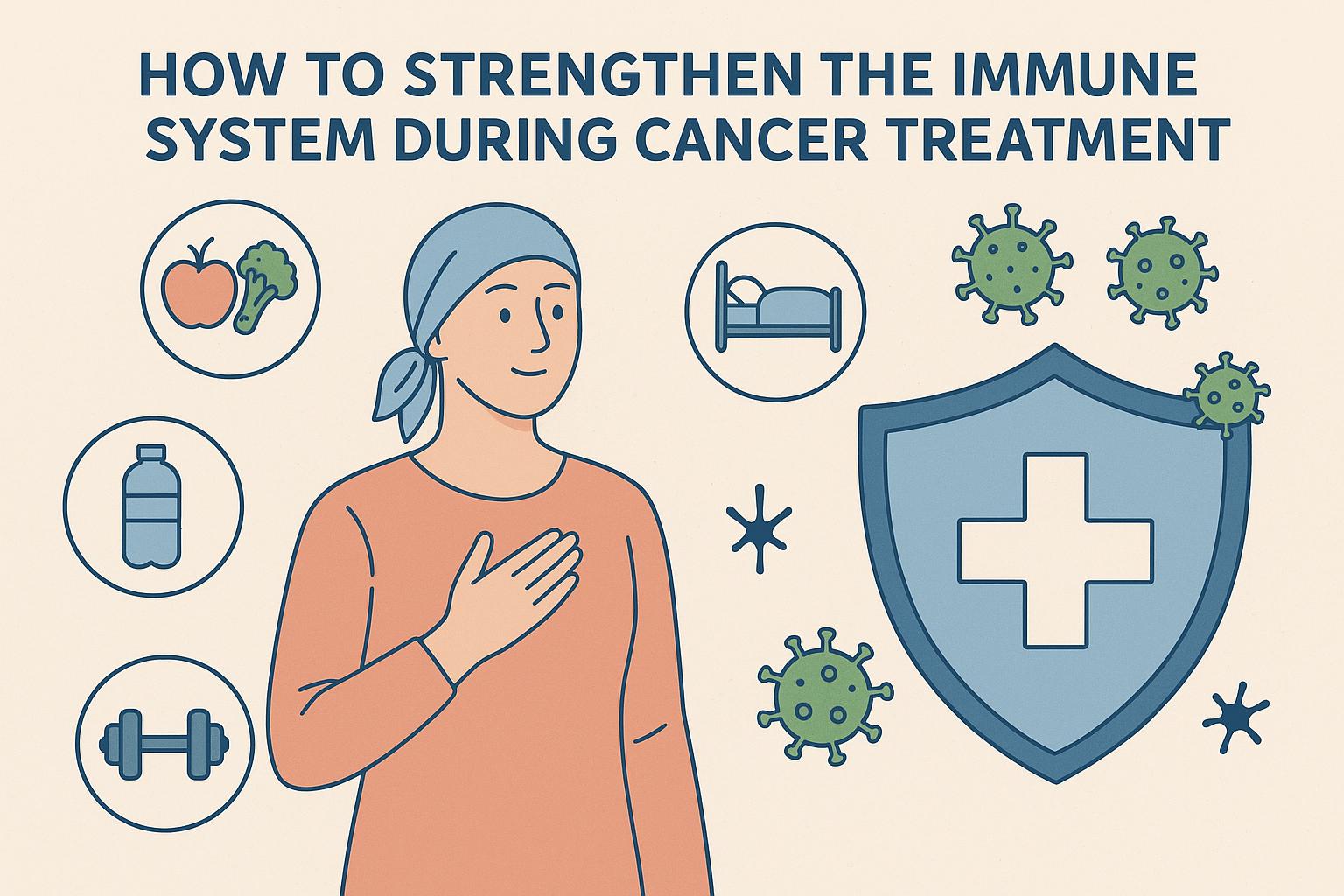Understanding the Importance of a Strong Immune System During Cancer Treatment
Cancer treatments, including chemotherapy and radiation, are known for their efficacy in combating cancer cells, but they also have a side effect: a weakened immune system. When the body’s natural defense mechanisms are compromised, the risk of infections and other illnesses increases. Therefore, bolstering the immune system during cancer treatment is integral to maintaining health and aiding recovery. This involves a combination of nutrition, physical activity, proper sleep, stress management, and preventive measures.
Nutrition and Diet: The Foundation of Immune Health
One of the most important factors in maintaining a robust immune system is a balanced diet. Consuming a variety of foods ensures that the body gets the essential nutrients needed for optimal immune function. Fruit and vegetables are high in vitamins and minerals, making them crucial components of a cancer patient’s diet. However, lean proteins such as chicken, fish, and legumes are equally important as they are the building blocks of the body’s cells, including immune cells. Whole grains provide fiber and are a source of energy.
Specifically, vitamin C, found in citrus fruits, helps to boost the production of white blood cells, the foot soldiers of the immune response. Vitamin D, accessible through sunlight exposure and fortified foods, is crucial for immune regulation. Zinc and selenium, found in nuts and seeds, are antioxidants that protect immune cells from damage. For tailor-made dietary plans, consulting with a registered dietitian who has expertise in oncology is advisable.
Hydration: The Underestimated Player
The role of hydration in maintaining immunity cannot be overstated. Water facilitates the circulation of oxygen and nutrients vital for immune function. It also plays a pivotal role in toxin removal, which, if accumulated, can impair the immune system. Cancer patients should aim for adequate hydration, taking into account factors such as treatment side effects that may alter fluid needs. This could involve consuming other fluids, such as herbal teas and broths, which offer additional nutritional benefits.
Regular Physical Activity: Keep Moving
Physical activity is an effective approach to enhancing immune function. Exercises, even those as mild as walking or stretching, support immune health by improving blood circulation, which ensures that immune cells are distributed efficiently throughout the body. Physical activity also helps to reduce inflammation and might boost mood and energy levels, a significant benefit given the emotional and physical toll of cancer treatment.
It is crucial, however, to discuss any exercise regimen with healthcare providers to ensure it is safe and appropriate, considering the patient’s specific condition and treatment plan. Even a customized, gentle exercise plan can have meaningful benefits for overall health and immune function.
Get Adequate Sleep: Repair and Regenerate
Sleep is an essential aspect of immune health, often overlooked amidst the bustle of treatment and healthcare appointments. During sleep, the body goes into repair mode, regenerating cells, including those critical for immune defense. Lack of sleep, or poor quality sleep, can lead to a weakened immune response and higher susceptibility to infections. Cancer patients should prioritize getting 7-9 hours of quality sleep each night. Establishing a regular sleep routine, creating a restful environment, and avoiding stimulating activities before bedtime can enhance sleep quality.
Stress Management: A Calmer Mind for a Healthier Body
The link between stress and immune function is well-documented. Chronic stress can lead to prolonged release of stress hormones like cortisol, which weaken the immune system over time. To mitigate this, cancer patients should practice stress-reducing techniques. Deep breathing exercises can offer immediate relief, while practices like meditation and yoga provide long-term benefits by promoting relaxation and mindfulness.
Moreover, seeking mental health support from professionals can be invaluable. Counseling can help patients manage emotional stressors associated with cancer and treatment, providing coping strategies and emotional relief. Engaging with cancer support groups may also provide additional community support.
Avoid Exposure to Infections: A Proactive Approach
Cancer treatment necessitates deliberate efforts to reduce the risk of infections. Since the immune system is compromised, practices such as regular hand washing, avoiding contact with sick individuals, and staying away from crowded places are essential preventive measures. Additionally, vaccinations play a critical role in providing protection against certain infections. Patients should consult with their healthcare providers to discuss appropriate vaccinations and create a personalized plan to protect against infections.
Conclusion
In summary, maintaining a strong immune system during cancer treatment requires a comprehensive, multifaceted strategy. Patients should focus on a balanced diet rich in essential nutrients, commit to regular physical activity, ensure they get adequate sleep, employ effective stress management techniques, and practice infection prevention. Collaborating with healthcare professionals, including oncologists, dietitians, and mental health experts, can provide patients with personalized guidance and support. These combined efforts are key to supporting overall well-being and enhancing the quality of life during the challenging journey of cancer treatment.
This article was last updated on: October 9, 2025

